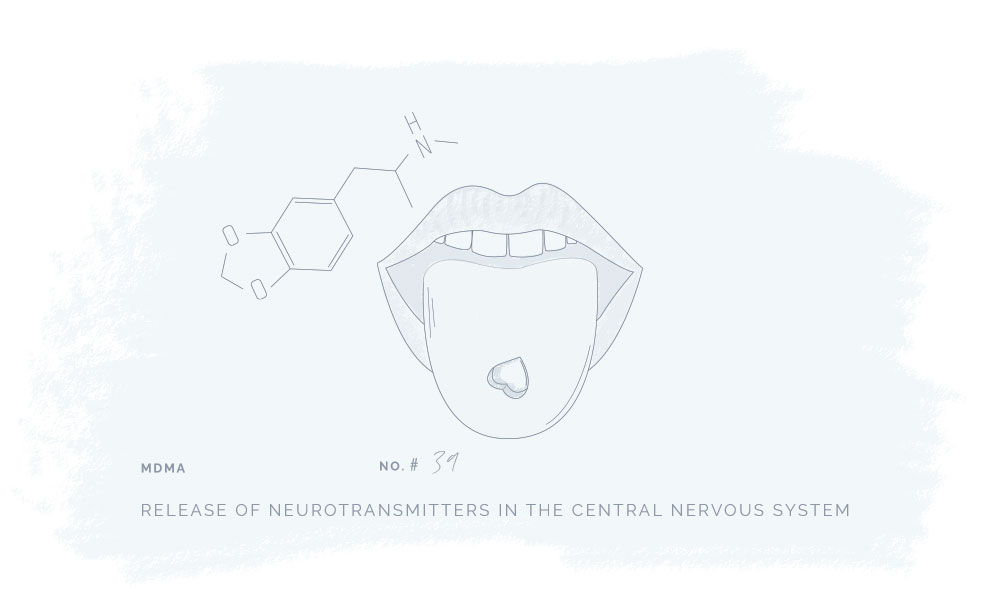MDMA Intoxication
Category
Behavioral, Psychiatric, Neurodevelopmental
REVIEWED BY
Our Biomedical Scientist
Reviewed based on
Literature Discussion
Last update
November 2020

What is MDMA Intoxication
MDMA, or 3,4-methylenedioxy-methamphetamine, commonly known as ecstasy is a synthetic drug that causes the release of the neurotransmitters serotonin , dopamine and norepinephrine in the central nervous system.
MDMA intake leads to arousal, alertness, focus, restlessness, and anxiety. It increases heart rate, blood pressure and triggers the release of glucose in the central nervous system. 1
Symptoms
MDMA intake can lead to a sense of euphoria, empathy, and enhanced sensuality.2
Acute illnesses of MDMA consumption are relatively rare, however, if complications occur, they may be fatal.
The main symptoms of MDMA intoxication are:1
The connection between Cannabinoids & MDMA Intoxication
Studies find that CBD and THC may have great therapeutic potential and may be used to help treat MDMA Intoxication. CBD and THC are well-known cannabinoids, however, they do not have the same psychoactive effects. THC is psychoactive while CBD does not possess psychoactive effects. According to WHO guidelines, the cannabidiol CBD is generally well tolerated with a good safety profile.
Preclinical data proposes that the cannabinoid THC may be therapeutic in the treatment of MDMA intoxication as THC exhibits antioxidant and anti-inflammatory effects, whereas MDMA causes oxidative stress.4
The literature discussion is an overview of the published results from scientific studies investigating if and how cannabinoids can be beneficial in the treatment of Psoriasis. The overview will be updated regularly to ensure the newest and most accurate information.
THC may help reduce and prevent symptoms of MDMA intoxication
MDMA (often known as ecstasy) was shown to produce various effects including hyperthermia, oxidative stress, and neuronal damage.
THC was observed to produce hypothermia as well as exhibit antioxidant and anti-inflammatory activities. In one study, mice were given MDMA (20 mg/kg x 4) and were pretreated with THC (3 mg/kg x 4) to evaluate the effect of THC. It was found that hyperthermia, glial activation, and dopaminergic terminal loss were prevented by THC. 4
Similarly, in rhesus monkeys, MDMA-induced hyperthermia (1.78 mg/kg oral) was prevented by 0.3 mg/kg THC (intramuscular) in a CB1-dependent manner.5
In rats, hyperthermia, increased anxiety-like behavior, and reduced exploration can be the effects produced by MDMA. These behavioral effects were shown to be reduced by THC. 6
Clinical trials are research studies that examine new treatments and evaluate their effects on human health outcomes.
Today, we are not able to provide any clinical trials about cannabinoids and MDMA Intoxication.
- https://academic.oup.com/bja/article/96/6/678/326917
- https://emedicine.medscape.com/article/821572-overview
- https://ghmedical.com/endocannabinoid-system/diseases/mdma-intoxication
- Tourino, C., Et Al., (2010). “THC Prevents MDMA Neurotoxicity in Mice”. https://journals.plos.org/plosone/article?id=10.1371/journal.pone.0009143
- Taffe, M.A., (2012). “Δ9-Tetrahydrocannabinol attenuates MDMA-induced hyperthermia in rhesus monkeys”. https://www.sciencedirect.com/science/article/abs/pii/S030645221101325X
- Shen, E.Y., Et Al., (2011). “Chronic administration of THC prevents the behavioral effects of intermittent adolescent MDMA administration and attenuates MDMA-induced hyperthermia and neurotoxicity in rats”. https://psycnet.apa.org/record/2011-16689-001
CANNABINOIDS & RECEPTORS
Below you find the plant cannabinoids, cannabinoid receptors, and endocannabinoids that are associated with the potential therapy.
If you have any further information relevant to the connection between MDMA Intoxication and cannabinoids or find any of the information inaccurate, outdated or incomplete please contact us here.

